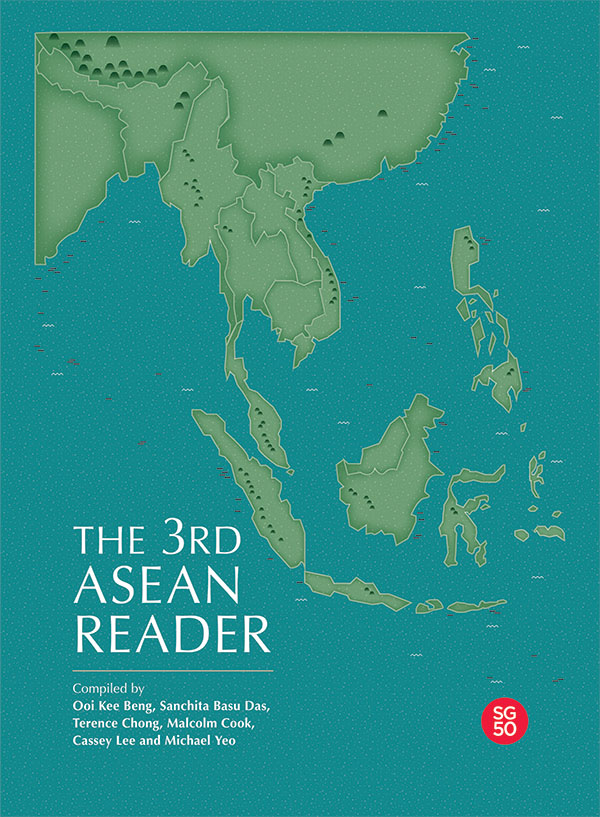Book contents
- Frontmatter
- Contents
- Preface
- Forewords to the First and Second ASEAN Reader: ASEAN: Conception and Evolution
- Forewords to the First and Second ASEAN Reader: ASEAN: The Way Ahead
- Forewords to the First and Second ASEAN Reader: New Challenges for ASEAN
- SECTION I ASEAN: THE LONG VIEW
- SECTION II COUNTRY ANALYSES
- SECTION III COMPARATIVE ANALYSES OF THE REGION
- Southeast Asian Societies
- The Southeast Asian Economy
- Southeast Asian Politics
- SECTION IV INTERNATIONAL DEVELOPMENTS
- SECTION V INSTITUTIONS OF ASEAN
- SECTION VI ASSESSING ASEAN'S INTERNAL POLICIES
- ASEAN Political Security Community
- ASEAN Economic Community
- ASEAN Socio-Cultural Community
- 52 An ASEAN Community for All: Exploring the Scope for Civil Society Engagement
- 53 Civil Society and the ASEAN Community
- 54 The Evolving ASEAN Human Rights System: The ASEAN Human Rights Declaration of 2012
- 55 Divided or Together? Southeast Asia in 2012
- 56 The ASEAN Socio-Cultural Community
- 57 ASEAN Socio-Cultural Community: An Assessment of its Institutional Prospects
- 58 Executive Summary of the Mid-Term Review of the ASEAN Socio-Cultural Community Blueprint (2009—2015)
- SECTION VII ASSESSING ASEAN'S EXTERNAL INITIATIVES
- ASEAN Processes
- ASEAN's Major Power Relations
- SECTION VIII SOUTHEAST ASIA: PERIPHERAL NO MORE
- Bibliography
- The Contributors
- The Compilers
57 - ASEAN Socio-Cultural Community: An Assessment of its Institutional Prospects
from ASEAN Socio-Cultural Community
Published online by Cambridge University Press: 22 June 2017
- Frontmatter
- Contents
- Preface
- Forewords to the First and Second ASEAN Reader: ASEAN: Conception and Evolution
- Forewords to the First and Second ASEAN Reader: ASEAN: The Way Ahead
- Forewords to the First and Second ASEAN Reader: New Challenges for ASEAN
- SECTION I ASEAN: THE LONG VIEW
- SECTION II COUNTRY ANALYSES
- SECTION III COMPARATIVE ANALYSES OF THE REGION
- Southeast Asian Societies
- The Southeast Asian Economy
- Southeast Asian Politics
- SECTION IV INTERNATIONAL DEVELOPMENTS
- SECTION V INSTITUTIONS OF ASEAN
- SECTION VI ASSESSING ASEAN'S INTERNAL POLICIES
- ASEAN Political Security Community
- ASEAN Economic Community
- ASEAN Socio-Cultural Community
- 52 An ASEAN Community for All: Exploring the Scope for Civil Society Engagement
- 53 Civil Society and the ASEAN Community
- 54 The Evolving ASEAN Human Rights System: The ASEAN Human Rights Declaration of 2012
- 55 Divided or Together? Southeast Asia in 2012
- 56 The ASEAN Socio-Cultural Community
- 57 ASEAN Socio-Cultural Community: An Assessment of its Institutional Prospects
- 58 Executive Summary of the Mid-Term Review of the ASEAN Socio-Cultural Community Blueprint (2009—2015)
- SECTION VII ASSESSING ASEAN'S EXTERNAL INITIATIVES
- ASEAN Processes
- ASEAN's Major Power Relations
- SECTION VIII SOUTHEAST ASIA: PERIPHERAL NO MORE
- Bibliography
- The Contributors
- The Compilers
Summary
INTRODUCTION
The Southeast Asian region's quest for community-building is ambitious in its thoroughness, encapsulating both the traditional realms of political-security relations and economic integration and seeking to further produce a common social and cultural community.
The socio-cultural diversity of ASEAN member-states has not stopped its leaders from conceptualizing a community that will somehow forge unity and solidarity amongst the different peoples in Southeast Asia.
There is a dearth in studies that focuses on the third ASEAN community: the [ASEAN Socio-Cultural Community] ASCC. Because it is the newest among the communities, this is understandable. There have been previous studies on functional cooperation in ASEAN including the problems of putting people at the center in regional community-building.
There is a need however, to see whether community-building in functional areas, which are the main priorities in the ASCC, can be institutionalized.
In order to assess the viability of the ASCC, the following are asked:
1. Who and what social entities are allowed to exist under the ASCC?
2. What regulations are being sought to regulate the everyday activities of the ASCC?
3. What procedures are envisioned to guide the interaction of actors in the ASCC?
4. Would all of these reduce uncertainty and generally constrain the political and social behavior of the actors?
5. In the case of shared regional identity, what are the possible consequences of institutionalization?
INSTITUTIONALISM IN ASEAN: A BRIEF REVIEW OF LITERATURE
Douglass North defined institutions as humanly devised constraints that structure political, economic and social interactions. The main purpose of institutions is to reduce uncertainty in exchange. This can be understood to mean building confidence in transactions or negotiations allowing contracting parties to dialogue on almost equal terms. Informal rules can be just as binding as formal rules. The concept of the “ASEAN Way”, which means that decisions are made through consensus and that non-interference in the internal affairs cannot be violated, is an example of such an informal rule.
This rule stems from the inception of ASEAN where the founding states sought to stabilize their regional affairs to ensure that they have a free hand in dealing with their internal problems.
- Type
- Chapter
- Information
- The 3rd ASEAN Reader , pp. 298 - 302Publisher: ISEAS–Yusof Ishak InstitutePrint publication year: 2015



